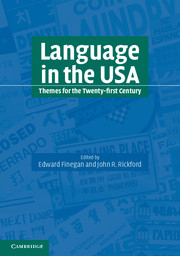Book contents
- Frontmatter
- Contents
- List of figures
- List of tables
- List of contributors
- Acknowledgments
- Foreword
- Editors' preface
- Part 1 American English
- Part 2 Other language varieties
- Part 3 The sociolinguistic situation
- 15 Language ideology and language prejudice
- 16 Ebonics and its controversy
- 17 Language planning, language policy, and the English-Only Movement
- 18 Language in education
- 19 Adolescent language
- 20 Slang
- 21 Hip Hop Nation Language
- 22 Language, gender, and sexuality
- 23 Linguistic identity and community in American literature
- 24 The language of doctors and patients
- 25 The language of cyberspace
- 26 Language attitudes to speech
- Index
16 - Ebonics and its controversy
Published online by Cambridge University Press: 05 June 2012
- Frontmatter
- Contents
- List of figures
- List of tables
- List of contributors
- Acknowledgments
- Foreword
- Editors' preface
- Part 1 American English
- Part 2 Other language varieties
- Part 3 The sociolinguistic situation
- 15 Language ideology and language prejudice
- 16 Ebonics and its controversy
- 17 Language planning, language policy, and the English-Only Movement
- 18 Language in education
- 19 Adolescent language
- 20 Slang
- 21 Hip Hop Nation Language
- 22 Language, gender, and sexuality
- 23 Linguistic identity and community in American literature
- 24 The language of doctors and patients
- 25 The language of cyberspace
- 26 Language attitudes to speech
- Index
Summary
Editors' introduction
This chapter explores the origins and definitions of the term Ebonics, and the linguistic, educational and sociopolitical implications of the Oakland school board's 1996 resolution recognizing Ebonics as the primary language of its African American students. The controversy sparked by this resolution was both intense and international. It was one of the biggest linguistic brouhahas in the USA in the twentieth century.
In this, as in other recent work (Baugh 1999), John Baugh emphasizes the links between the language of African Americans and their linguistic and educational legacies as slave descendants – people who, more so than other Americans, were not allowed to maintain their ancestral languages or have equal access to education and justice. As he notes, the African American linguists who first defined Ebonics in the 1970s saw it as a continuum, including “the communicative competence of the West African, Caribbean and US slave descendants of African origin” (Williams 1975: v). This international and multilingual connection was implicit in the Oakland school board's December 1996 resolution, but less so in their January 1997 revision, which portrayed it primarily as an American variety of English, in concert with the supportive resolution of the Linguistic Society of America. Baugh presents other definitions of Ebonics and discusses the reactions to and policy implications of recognizing the legitimacy of the vernacular of African Americans, including its potential role in developing fluency in standard English.
- Type
- Chapter
- Information
- Language in the USAThemes for the Twenty-first Century, pp. 305 - 318Publisher: Cambridge University PressPrint publication year: 2004
- 4
- Cited by



